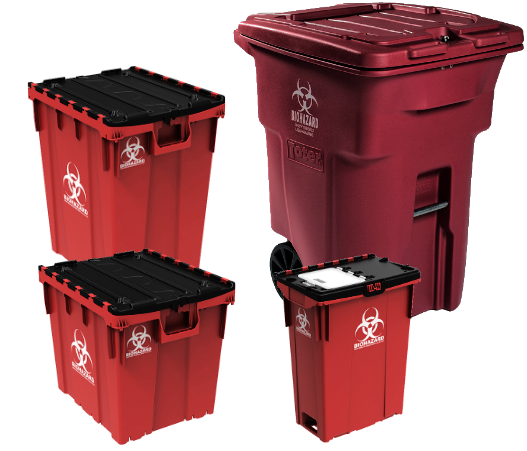Discovering Different Waste Disposal Options for a Cleaner Environment
In the quest of a cleaner setting, the management of waste disposal has actually arised as an essential focal point for sustainable growth. With a plethora of waste disposal options readily available, varying from traditional landfill methods to cutting-edge waste-to-energy innovations, the option of exactly how we manage our waste has significant ramifications for our world's health.
Recycling Approaches
Carrying out reliable recycling methods is essential in minimizing waste and promoting sustainability in our atmosphere. Reusing includes the procedure of converting waste products right into multiple-use challenge stop unnecessary disposal. One of the most usual recycling approaches is worldly recovery, where products like paper, glass, metal, and plastic are collected, sorted, and processed to produce brand-new products. This process not just conserves natural deposits but also lowers power usage and greenhouse gas discharges connected with generating brand-new products from the ground up.
An additional essential recycling technique is composting, which includes decomposing organic waste like food scraps and backyard trimmings into nutrient-rich dirt. This process not just draws away organic waste from landfills but also creates a beneficial resource for gardening and agriculture. Additionally, upcycling is an innovative recycling approach that entails transforming old or discarded products right into items of greater high quality or value. By including these different recycling approaches right into our waste administration practices, we can dramatically lower our environmental impact and move in the direction of a much more sustainable future.

Composting Strategies
Efficient waste administration practices, such as reusing techniques, lead the way for a cleaner environment, and currently, changing the focus to 'Composting Techniques', we discover lasting methods to disintegrate organic waste for environmental advantage. medical waste removal.
Composting is a natural process that transforms natural waste, like food scraps and backyard trimmings, right into a nutrient-rich dirt amendment. The trick to successful composting depends on developing the right balance of environment-friendly products, such as fruit and vegetable scraps, and brown products, like dried out branches and leaves. These materials decompose with the aid of microorganisms, breaking down the waste into valuable garden compost.
Standard backyard composting entails layering natural materials in a container or stack and routinely turning the combination to aerate it. By utilizing composting methods, we can reduce the amount of waste sent to garbage dumps while producing an advantageous product for enriching dirt and supporting plant growth.
Incineration Advantages And Disadvantages
Incineration, as a waste disposal method, provides both advantages and disadvantages that merit cautious consideration in the world of lasting waste management techniques. On the positive side, incineration can considerably reduce the quantity of waste, lessening the need for land fill space and possibly decreasing greenhouse gas exhausts.
Furthermore, the high first investment and functional prices of incineration facilities posture economic obstacles, making it a much less affordable option contrasted to various other waste monitoring techniques. Cautious tracking and guideline are necessary to alleviate these adverse impacts and optimize the advantages of incineration as component of a thorough waste monitoring strategy.
Garbage Dump Administration Methods
Landfills play a vital duty in waste administration and ecological conservation by giving a control system for the disposal of solid waste products. By compacting the waste, the volume is reduced, allowing for even more waste to be fit over time.
Additionally, the implementation of everyday cover techniques is essential in decreasing smells, protecting against litter, and reducing the destination of parasites. Covering the disposed waste at the end of every day helps to consist of odors and stop prospective ecological contamination. Furthermore, the monitoring of garbage dump gas emissions and leachate degrees is essential in making sure that environmental requirements are satisfied which any kind of prospective dangers to bordering environments are reduced.

Waste-to-Energy Technologies
One of the innovative strategies to lose management entails utilizing Waste-to-Energy modern technologies to transform solid waste right into usable power sources. Waste-to-Energy (WtE) modern technologies encompass a variety of processes that aim to extract power from waste materials with thermal, chemical, or biological methods. This conversion procedure not just reduces the volume of waste that ends up in garbage dumps but also generates important energy resources such as power, heat, or biofuels.
Incineration involves burning waste at high temperature levels to generate warmth and electrical power. Gasification transforms waste right into a syngas, which can be used for power generation or chemical production.
Applying Waste-to-Energy technologies can aid mitigate environmental issues connected with standard garbage disposal techniques while concurrently giving an eco-friendly energy source. Cautious consideration must be offered to exhausts control and ensuring the sustainability of feedstock products for these innovations to be absolutely valuable for a cleaner atmosphere.
.jpg)
Conclusion
To conclude, exploring numerous waste disposal choices such as reusing, composting, incineration, garbage dump administration, and waste-to-energy innovations is important for advertising a cleaner atmosphere - click here. Each method has its own advantages and obstacles, yet by making use click here of a mix of these techniques, we can function towards minimizing the quantity of waste that winds up in landfills and eventually add to a more sustainable future for generations to find
With a wide variety of waste disposal alternatives readily available, ranging from standard land fill techniques to cutting-edge waste-to-energy innovations, the selection of just how we handle our waste has far-ranging implications for our planet's well-being. medical waste removal.Incineration, as a waste disposal technique, presents both advantages and negative aspects that warrant mindful factor to consider in the realm of lasting waste monitoring methods.Landfills play an important function in waste management and environmental conservation by offering a control system for the disposal of solid waste products. By condensing the waste, the quantity is reduced, enabling for more waste to be suited over time
One of the cutting-edge strategies to waste monitoring entails using Waste-to-Energy technologies to transform solid waste into useful energy sources.